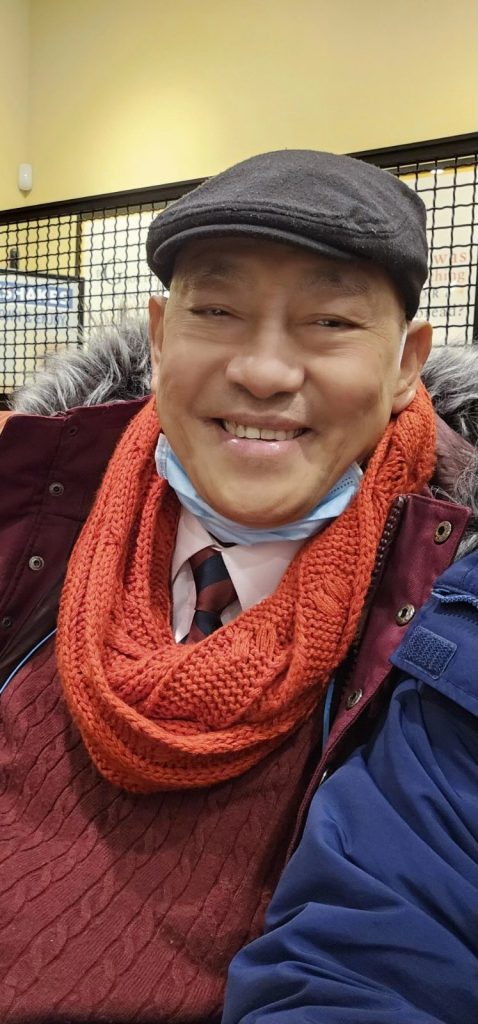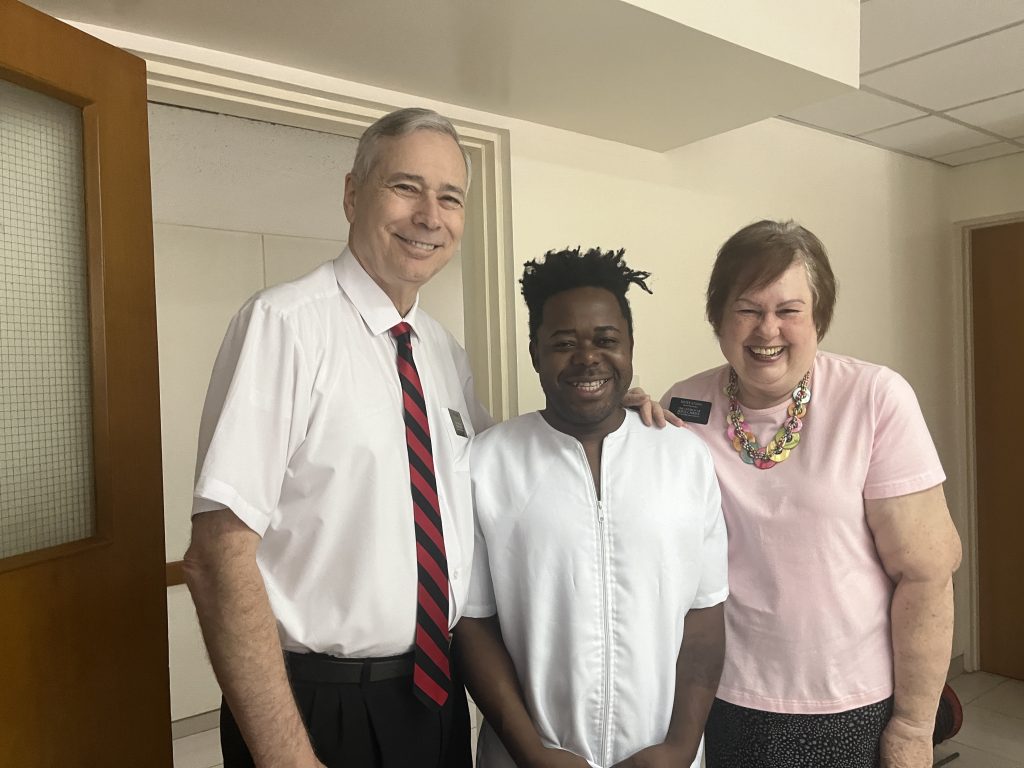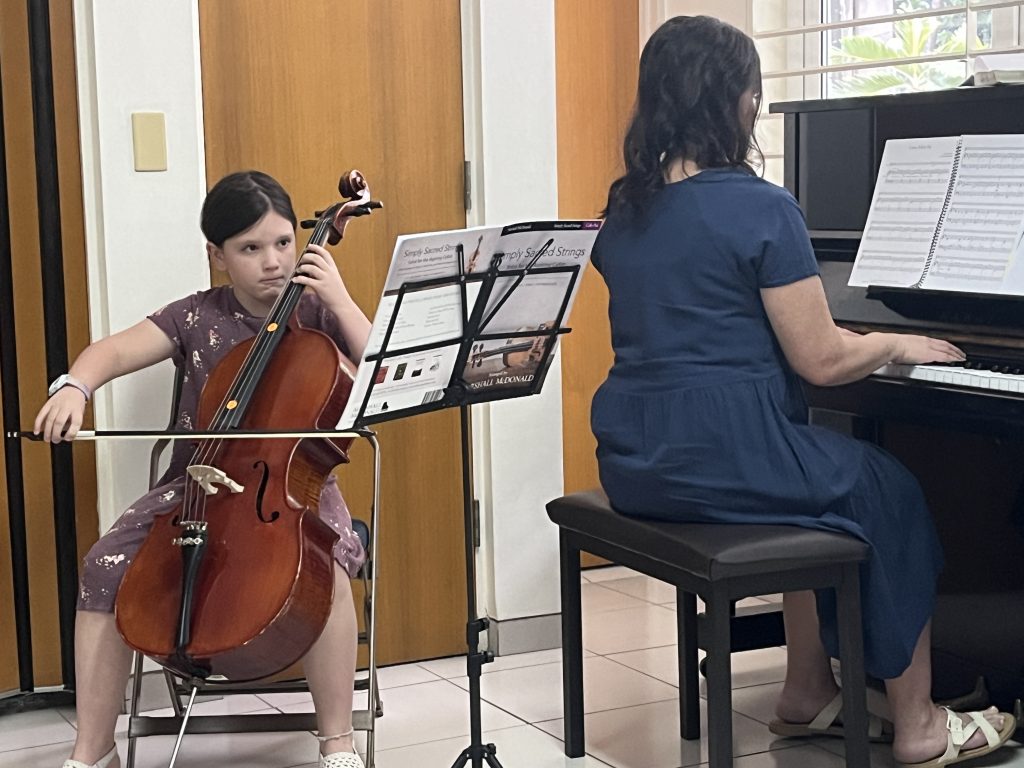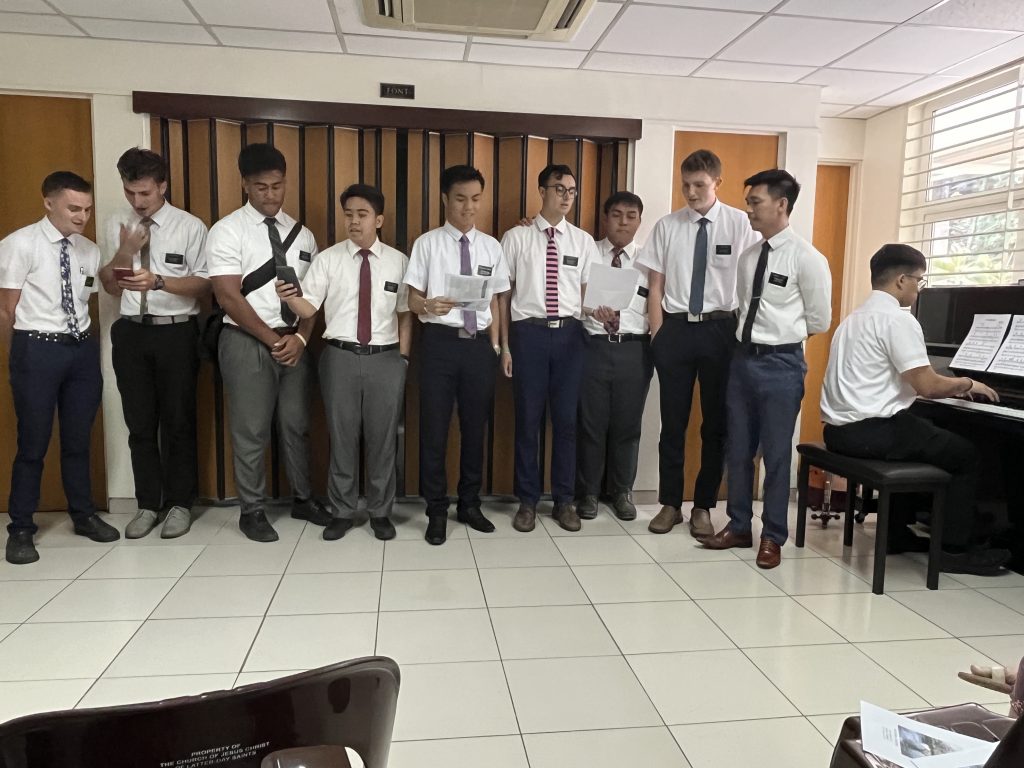As I have shared before, years ago Marcia and I were called to be serve in the Oakland 9thBranch (later to become the Oakland 9th Ward) where we served for six years. Initially, I was assigned as the executive secretary to a young newly married branch president. During this calling I met a Filipino – Joe Aliling. Joe and I became good friends over the years that we served there. He was the epitome of the most faithful of Latter-Day Saints.
Although I knew that he was Filipino, I never took the time to ask him to share the story on how he ended up in the San Francisco Bay Area after spending most of his life in the Philippines. After we relocated to El Dorado Hills east of Sacramento, we only talked occasionally. When we arrived in the Philippines, after a few months I reached out to Joe and asked him more about his life’s journey. As he shared his life story, I was blown away to learn how unique and amazing his story is. I will only give you a brief summary, hitting the highlights of rather unexpected life.
Joe was born in a remote city south of Manila. He was always a bright student and received a scholarship to the most elite university in the Philippines – the University of the Philippines. Since he exceled in math, this led him to major in electrical engineering. At the time, he was a Catholic and he had a vision of the type of wife he wanted and that she would teach his kids to be God fearing Filipinos.
Eventually, he met his wife, a student at UP, through a friend. Although she wanted to become a medical doctor, her godfather suggested getting a doctorate degree on the preventive side of medicine vs. the treatment side. She would go on to earn a master’s degree and a doctorate degree in nutrition. During this time, she served on several high-level committees. On one of these committees, her committee chair gave her a Book of Mormon.
After graduating, Joe went to work for Pepsi and shortly was promote to be a manager in charge of their transition from analog to the digital world in some of their manufacturing processes. John Scully (Pepsi’s CEO was recruited by Steve Jobs to be the CEO Apple with his famous challenge “do you want to be known for selling sugar water or changing the world”) initiated a management training program which Joe was recruited to join as a rising star. Pepsi paid for him to get an MBA. While he was busy getting an MBA and burning the candle at both ends because he was still working, the missionaries knocked on their door. Although it took nearly a year before Joe could find the time to meet with the missionaries, his wife had the missionaries over weekly for dinner. Eventually, the Aliling’s were baptized into the Church.
Through a series of events (too long to discuss here) he was recruited to teach at UP and became a tenured professor as well as a management consultant to the Philippines government. Joe established himself as a key player in government circles establishing relationships that later would prove to be vital to enhance relations between the Church and the Philippines government.
Interestingly, a member of our Orinda Ward in Moraga, California, where we lived for over thirty years, was a high-level person who worked in the San Francisco Office of the FBI. After this person, Garth Andrus, retired was called to be one of the early mission presidents in Manila. As often happens, rumors started that these young men in white shirts and ties from America were really CIA agents and spies. This rumor was enhanced by the fact that the Manila mission president was former FBI. This rumor created some barriers for missionaries to be able to get visas and there were limits on the number of missionaries allowed in the country at one time.
Because some of Joe’s classmates at UP were now in important government positions and a few of his friends were working in the immigration department. Because of these contacts and working with Elder Hinckley, an apostle at the time (he was on a first name basis with most of the General Authorities), Joe arranged for a group of government officials (some of his friends) to visit the Mission Training Center in Provo to allow these government officials to see what was being taught. During their visit what they saw were young men learning the Filipino culture, singing Filipino songs, and learning to speak Tagalog. Based on this and further discussions, many of the immigration barriers for missionaries to enter the Philippines faded away.
Another antidote Joe shared with me as we prepared to record his oral history, was about how his background and education allowed him to travel all over Asia on a government passport (referred to as a “Red Passport” – the passport was literally red) at no cost as a part of his consulting role for the government. On one such trip, he had picked up the LDS Seminary Curriculum for the upcoming year on his way to the airport. He had a flight to Davao and his thought was to review all of this educational material on the flight to and from Davao.
Sitting next to him happen to be the Secretary of Education for the Philippines. A discussion ensued which eventually ended up in a group of officials in the Department of Education for the Philippines going to Brigham Young University and visiting the McKay College of Education to learn more about their teaching methodology some of which eventually was incorporated into some of the school curriculum in the Philippines.
Now for the movie plot line of his life.
As a part of his role as consultant for the government and his background as an MBA and educator, he was asked to set up a commission to investigate graft and corruption on government contracts. After digging and uncovering irregularities, he was finishing the final preparation of his report – which was not complementary to a lot of people, he got a phone call from his stake president (Joe was a counselor in the stake presidency) telling him not to go home and to tell his wife to stay with family for a few days and he would pick him up at UP Campus.
After the stake president picked him up, he told him that he had information that his life was in danger because some of the contents of his report had been leaked and since the report named names, etc., he was not looked on by a lot of powerful people very favorably. The stake president told him that he was taking him directly to the airport and Joe needed to use his Red Passport to get on a flight to the San Francisco Bay Area with nothing but the clothes on his back.
At least in my life, it’s rare that I get to talk to someone like Brother Joe Aliling who was instrumental in key aspects of allowing the gospel to grow and prosper in a country like the Philippines. The interesting thing is that I would not have known any of this if I hadn’t had the responsibility to capture some of the history of the Philippines by interviewing and talking to Filipino saints and leaders. I often wonder how many other unique stories I’ve missed along the way.

Joe Aliling in Oakland California
An Unusual Oral History
Five months ago, we met Manny Nester at the Makati 4th Ward and shortly after this we were invited to dinner with another senior missionary couple where we began to hear of this rather unique life story that brought him to the Philippines.
Manny was born into the Muslim faith. After marrying several wives, these wives were unable to give birth to a son which is prized by Muslims families. His father took additional wives to help solve this problem. Eventually, the male curse came to an end with the birth of Manny.
His father and grandfather were respected members of the Muslim community and now with a son Manny was groomed to carry on the family name. He was enrolled in the best schools and was the center of attention of his father and grandfather.
When he was eleven years old, he walked by a Christian revival meeting. He stopped to listen and was touched by the spirit. He returned several times and later he met several Baptist missionaries that was a part of the Christian group meetings he had been attending. Eventually, he accepted their invitation to join some additional meetings and activities. To be able to do this, he had to sneak out of school in the evenings and on weekends. These clandestine meetings continued until he was inevitably discovered.
After his Christian activities were uncovered, his father retrieved him from the boarding school and he was taken to his grandmother’s home, coaxed to abandon these Christians which he refused to commit to doing. This resulted in beatings. This continued and he was given an ultimatum to stop, confess, and promise never to see these infidels again. His parent had told him to think about what they had talked to him about and sent him away to think about what he was going to do. He decided he couldn’t do what they were asking him to do and decided to run away which he did that night.
Having no other means of supporting himself, he became a homeless street urchin begging for food (keep in mind he was thirteen years old), often sleeping in mosques in a neighboring community because he knew the schedule at mosques. His homeless plight continued for several years. The original missionaries had returned to the US.
Eventually, he met another Baptist missionary. After Manny shared his story with this missionary, the missionary teared up and said that he had heard about him and he was one of the reasons they had decided to come to Uganda and to try and find him. This person was Tony Nester. The Nester’s provided a home for him, enrolled him into school, and provided much needed family structure and love. Manny decided to take the Nester family name.
Eventually, his former Muslim friends learned where Manny was living. All of his friends were told that he had died. When his friends found out he wasn’t dead, they began to persecute him by stoning and harassing him. After his new Christian friends heard that his family had told everyone he was dead, they called him Lazarus because he had come back from the dead.
After the Nester family returned to America, Manny decided to move to Kenya to get away from his past and some of the persecution. After settling down in Kenya, he sought out Christians and made friends with a Korean. This friendship blossomed and when this young man returned to Korea he invited Manny to join him on a three-month visitor’s visa. After staying in Korea for a few months, Manny decided to stay in Korea and return to school. He was able to get a full-ride soccer scholarship. However, to qualify for the scholarship, he had to pass the Korean language exam. He studied for the exam and passed it. He majored in business and the Korean language. While attending school, he started a youth ministry on campus and was able to get paid for the youth group speaking engagements. This is how he began to support himself.
During one of these speaking engagements at a youth camp retreat, he met an LDS young lady named Caitlin. They became friends but he thought she was weird because of some of her beliefs on Christ, the sacrament and the Book of Mormon. Nevertheless, they remained friendly and after the camp ended they continued emailing each other. Eventually, Kaitlin returned to the US and he later learned that she was serving an LDS mission.
Three years later, he became friends with some LDS missionaries while helping these missionaries with their Korean and he began playing basketball with them. During this time, Caitlin’s father was visiting Korea on business and took Manny to dinner and they talked religion. Manny listened politely but never took the things Caitlin’s father was talking to him about to heart.
He continued to play basketball with the LDS missionaries. When some of the Christian youth ministry leaders learned he was hanging out with the LDS missionaries, they kicked him out of their church because of his association with the missionaries. Now that he had lost his source of income, he got a job on one of the US military bases. During this time, he met and began to date a young American soldier. They were eventually married.
Less than a year after his marriage, he had a family situation in Uganda that he needed to be addressed. He went to Uganda and on his return trip to Korea on a stopover in Istanbul as he tried to board the plane to Soule, his ticket and passport were flagged. He was told that his Korean Visa was no longer valid…which was news to him. Since he didn’t have a Turkish Visa, he couldn’t go to the Korean Embassy in Istanbul to sort things out. The officials at the airport said that the Philippines didn’t have restrictive visa requirements and he could go to the Korean Embassy in Manila to get this visa issues resolved. He flew to Manila.
This began a seven-month long saga of attempting to get an appointment with the Korean Embassy in Manila. During his time in the Philippines, he was in contact with Caitlin and her father who told Manny that he had friends in the Makati 4th Ward in Quezon City. Instead of contacting the Baptist church because of how unchristian they had been to him in Korea by kicking him out of their church for playing basketball with the LDS missionaries, he decided to seek out the friend of Caitlin’s father that lived in the Makati 4th Ward. He Googled the nearest church building and walked into the chapel on a Sunday morning.
Manny said when he walked into the chapel on the first Sunday, he felt the same type of spirit he had at other times in his life when faced with big decisions, even when these decisions often resulted in challenges and persecution. Seven months later after many long and all-encompassing teaching sessions, Manny was baptized on January 28, 2024.
In the meantime, his wife has been reassigned to Atlanta, GA. He now has an appointment with the Korean Embassy in Manila the first week in March of 2024.
A few days after his baptism, we were able to capture Manny life’s story in an Oral History Interview. Some of the interviews we participate in are special because the spirit of the Lord is so strong as these individuals we interview share their stories of trials, faith, and their journey to the gospel.
For Manny, as he shared his story, he ended the oral history interview with the perspective that everything that has happened to him in his life was Heavenly Father guiding him on his journey to the restored gospel of Jesus Christ.
The Joy of a Finding the Gospel and being Baptized
Since our senior mission is not specifically focused on proselyting, we don’t often get an opportunity to be directly involved in missionary work or related events. Recently, we had the opportunity to attend a baptismal service for Manny Nester. His story is fascinating. Here is an abbreviated version.


A mother and her nine year old daughter perform “Come Follow Me.”

Missionaries sing “Abide with Me “
The Philippines missionaries are from all over the world and Philippines. The missionaries in the picture come from the US, the Pacific island, and China. I often stand in amazement of the inspired nature of how the missionary program works. If it wasn’t inspired, it wouldn’t work. Meshing different cultures, languages, personalities, and temperaments that are thrown together and the result isn’t organized chaos but diligent hardworking young men and women.
I told my wife after talking to Elder Bliss and his companion that I was thinking back to my mission in South Africa over fifty years ago and about how I got up every day for over two and a half years and worked hard every day and never got home sic, or wanted to go home (in the days when you could only call home twice a year), as I thought about this, I marveled that I did it then and that these young missionaries are doing it today.
A thought to ponder: Often we feel the pure love of God most poignantly after there is true repentance.
Scripture of the day: “I know that he loveth his children; nevertheless, I do not know the meaning of all things.” -1Ne 11:17
